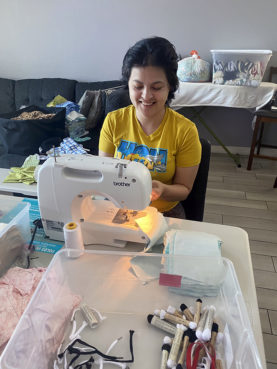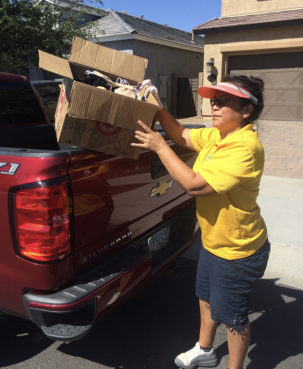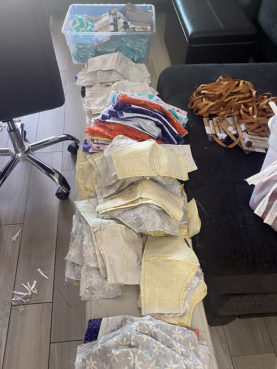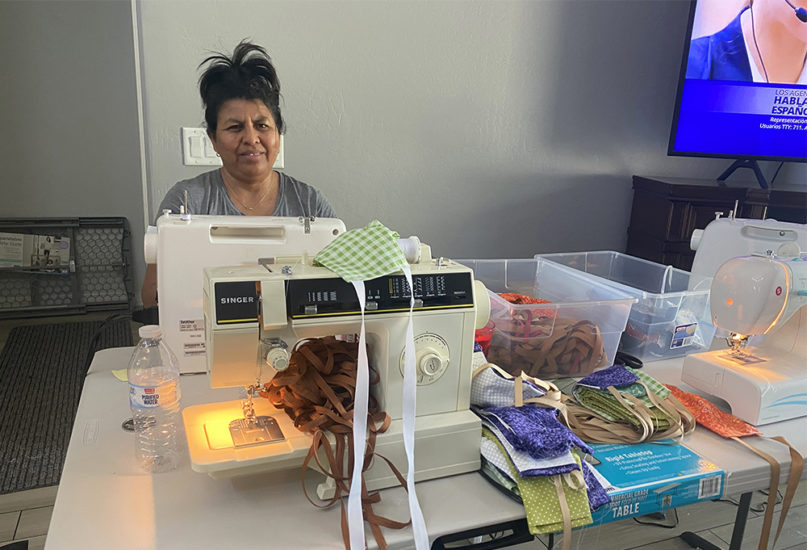PHOENIX (RNS) — The whir of sewing machines and hissing of steam irons fills a North Phoenix garage repurposed into a workshop producing face masks for seniors, refugees and members of the Navajo Nation.
The activity here is evidence of a new Arizona interfaith partnership, called “The Mask Project,” addressing the health and economic crisis caused by COVID-19.
The Mask Project was initiated by Arizona Jews for Justice, an organization founded to combat injustice and oppression in the state.
“Until this virus started, I worked in cleaning and filing paperwork at offices. Then all of a sudden, I was laid off,” said Stephanie, 32, an immigrant from Honduras. “It’s a good thing my mother taught me how to sew.”
The epidemic is hitting the Latino and Native American communities particularly hard in this border state, which is why Stephanie — who has requested her surname be withheld due to a pending application for U.S. citizenship — joined the mask-making effort that re-employs out-of-work immigrant women.
“Now I’m busy measuring linen, cutting cloth to fit moldings we have for masks, sewing the pieces together and then ironing them at the highest setting to keep them sterile,” said Stephanie, who, along with the other four women here, are active members of the nearby Amor International Evangelical Church.

Stephanie sews face masks May 1, 2020, for The Mask Project, where she has been helping produce the protective equipment for several weeks, in Phoenix. Photo by Eddie Chavez Calderon
“Our pastor is continuing to preach on Zoom,” said Maria, a 48-year-old Mexican immigrant who is working to support herself and five grandchildren. “We continue to believe that God will strengthen us in these hard times.”
Since the outset of the pandemic, Maria has been unable to pursue her usual livelihood selling perfume and clothes at the local swap meet.
“But I’m making 750 masks a week at this project, and at two dollars a mask, I’m bringing in enough to support my family,” she said.
The project demonstrates increasing ties between Arizona’s diverse religious communities, including Christians and Jews, as well as followers of Native American forms of spirituality.
“We are the Jewish group that mounted a daily response at the border facilities,” said Rabbi Shmuly Yanklowitz, president of Arizona Jews for Justice. “Over the last year alone, we’ve worked with over 40,000 asylum seekers in meeting their legal and medical needs.”
Yanklowitz said ongoing relationships with immigrant communities meant his group knew early on that the epidemic was bringing sudden unemployment and deep poverty to those groups.
“The epidemic is overwhelming. We see the numbers of deaths, and it’s paralyzing at times,” said Yanklowitz. “But our religious teachings tell us that ‘pikuach nefesh’ — saving lives — is the most important of commandments.”
The number of confirmed COVID-19 cases in Arizona continues to rise. The Arizona Department of Health Services (ADHS) confirmed Monday, May 18, that there have been 14,170 confirmed cases of COVID19 in Arizona and 686 COVID-19 deaths, an increase of six from the previous day.
Adam Bronfman, a member of Yanklowitz’s Valley Beit Midrash in Scottsdale and supporter of Arizona Jews for Justice, said he provided the seed money for this project because immigrants “are some of the hardest working people in our society. Now, they are potentially homeless because of a virus.”
“This epidemic underscores economic and health disparities that were hardly beneath the surface before the crisis arrived,” said Bronfman. “Our religious teachings urge us to participate in justice-driven charity.
“We are partnering on a respectful level, working to do what we can about the epidemic and provide an opportunity for work to individuals in desperate need for it.”

A native volunteer picks up masks from The Mask Project, in Phoenix, April 27 2020, to deliver to Navajo Nation recipients. Photo by Eddie Chavez Calderon
Since its inception in mid-April, The Mask Project has delivered 3,000 masks, including several hundred to the Navajo enclave of Tuba City.
The Arizona National Guard has been called into the town to help the staff at a regional health center overwhelmed by the coronavirus.
“Like the Jewish people, we’ve been tested through our life experiences and history,” said Debbie Nez-Manuel, a 48-year-old social worker and member of the Navajo Nation who has lost a grandmother and an uncle since the onset of the epidemic here in mid-March.
“Tribe members remember the pain and the strength of our ancestors who endured The Long Walk,” said Nez-Manuel, recalling the forced march imposed by U.S. troops on over 10,000 Navajos and Mescalero Apaches in the 1860s.
According to the Navajo Department of Health, there are a total of 3,912 cases of COVID-19 in The Navajo Nation, with 140 confirmed deaths, as of Saturday (May 16).
Nez-Manuel said the Navajo religion uses the metaphor of “walking” to describe the human life span and “going home” to describe death.
“We have no words for heaven or hell. It’s that it’s just time for us to go home to the mother of dawn, and she takes care of us,” she said. “The worst thing was we don’t want our elders to be alone as they prepare for this trip home.”
Along with other Arizona communities, members of the Navajo Nation are forgoing large funerals to maintain social distancing protocols. And only the immediate family residing on the reservations are participating in graveside rites.
“My grandmother was buried in a graveside ceremony with fewer than ten people present, said Nez-Manuel. “Yet she comes from a large clan, probably that numbers close to one hundred people. It was one of the hardest things we ever had to experience as a family.”
Before the COVID 19 crisis, AJJ was partnering with Nez-Manuel in inter-communal dialogue and voter registration efforts.

The Mask Project designs follow medical professional guidelines. Photo by Eddie Chavez Calderon
“Just before the COVID 19 outbreak, we started working with Debbie Nez-Manuel’s ‘Voices of Indigenous Voters’ program to make sure that Navajo and other native communities are represented at the polls, and we are hoping to resume this work again as soon as safely possible,” said Eddie Chavez Calderon, campaign organizer for the national Orthodox Jewish social action group Uri L’Tzedek and Arizona Jews for Justice.
Born in Michoacan, Mexico, Chavez Calderon, 24, chose Rabbi Yanklowitz as his spiritual mentor when he converted to Judaism.
“It has been a blessing to follow my Jewish spiritual values and aiding Arizona’s most vulnerable communities,” said Chavez Calderon.
Pastor Angel Campos — whose Monte Vista Cross-Cultural Church has been the target of harassment campaigns organized by white nationalist and anti-immigration groups, is participating in The Mask Project by transporting the protective gear along with food to poor Latino and Native families in Northern Arizona.
“I first got to know Eddie in 2018 when Jews for Justice provided food to the asylum seekers we hosted at our church,” Campos said. “Since the outbreak hit Arizona, they have also given us masks for our congregants.”
“The COVID 19 epidemic reminds me of the story of the lepers in the Book of Kings,” said Campos.
“In the end, the people who are sick bring blessings to their community. The Mask Project is a way to bring us together, even if we have to practice social distancing in our homes and places of worship.”
Rabbi Yanklowitz agrees.
“This is about a collective elevation of spiritual consciousness for empathy and compassion based on our mystical inter-connectivity,” said the Rabbi. “Martin Buber called this the ‘I-Thou’ dynamic where we see the spark of God, the light of divinity within each person.”





